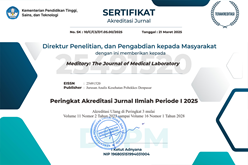POTENTIAL COMBINATION OF VIRGIN COCONUT OIL (VCO) AND AZADIRACHTA INDICA EXTRACT FOR ACNE CONTROL: A COMPOSITION PHYTOCHEMICAL AND IN VIVO ANTIBACTERIAL EVALUATION
DOI:
https://doi.org/10.33992/meditory.v11i2.3062Keywords:
Virgin coconut oil (VCO), Azadirachta indica, acneAbstract
Background: Treatment of acne can be done with topical and systematic therapy. There is the bacterial resistance to drugs, so other alternatives are needed that can utilize natural ingredients so that side effects can be reduced. Aims: The objective of this study was to determine the phytochemical content of a blend of VCO and Intaran (Azadirachta indica) leaf extract (VCO-I) at concentrations of 5%, 10%, and 20%, and to assess its effect on the in vivo inflammation induced by P. acnes. Methode: This study has a posttest-only control group design and is experimental. Rats in the experimental group were smeared with VCO-I at concentrations of 0% (P0), 5% (P1), 10% (P2), and 20% (P3); clindamycin (Cindala®) was used as the positive control (K+); and distilled water was used as the negative control (K-). The results: The results showed that VCO-I contained flavonoids, tannins, and alkaloids. The level increases as the mixture's concentration increases. Each VCO-I treatment was able to treat wounds or lesions that appeared due to the induction of P.Acne bacteria. There are differences in each treatment for healing the lesions. Based on the Post Hoc Bonferroni test P2 and P3 were not significantly different from K+, and K0 was significantly different from P0.. Conclusion: The addition of the extract can increase the activity of speeding up the healing of lesions and the effective mixture is at P2 and P3.
References
Vora, J., Srivastava, A., Modi, H.: Antibacterial and Antioxidant Strategies for Acne Treatment through Plant Extracts Informatics in Medicine Unlocked Antibacterial and antioxidant strategies for acne treatment through plant extracts. Informatics Med. Unlocked. 13, 128–132 (2019). https://doi.org/10.1016/j.imu.2017.10.005.
Suva, M.A., Patel, A.M., Sharma, N.: A Brief Review on Acne Vulgaris : Pathogenesis , Diagnosis and Treatment A Brief Review on Acne Vulgaris : Pathogenesis , Diagnosis and Treatment. 0–12 (2016).
Sitohang, I.B.S., Fathan, H., Effendi, E., Wahid, M.: The susceptibility of pathogens associated with acne vulgaris to antibiotics. Med. J. Indones. 28, 21–27 (2019). https://doi.org/10.13181/mji.v28i1.2735.
Ali, M.J., Obaid, R.F., Obaid, R.F.: Antibacterial activity for acne treatment through medicinal plants extracts: Novel alternative therapies for acne. J. Pure Appl. Microbiol. 13, 1245–1250 (2019). https://doi.org/10.22207/JPAM.13.2.66.
Wardania, A.K., Malfadinata, S., Fitriana, Y.: Testing the Antibacterial Activity of Staphylococcus epidermidis, the Acne-Causing Bacterium, Using Ashitaba Leaf Extract (Angelica keiskei). Lumbung Farm. J. Ilmu Kefarmasian. 1, 14 (2020). https://doi.org/10.31764/lf.v1i1.1206.
Karta, I.W., Burhannuddin: Suplementation Of Virgin Coconut Oil (Vco) Products With Intaran (Azadirachta indica) Leaf Extract In Inhibiting The Growth Of Acne Bacteria Propianibacterium acnes. J. Penelit. Pascapanen Pertan. 18, 131–138 (2021).
Yik‑Ling Chew: The Beneficial Properties of Virgin Coconut Oil in Management of Atopic Dermatitis. Pharmacogn. Rev. 1, 8–15 (2018). https://doi.org/10.4103/phrev.phrev.
Gupta, R., Nand, P., Drabu, S.: Insignificant anti-acne activity of Azadirachta indica leaves and bark. J. Pharm. Negat. Results. 3, 29 (2012). https://doi.org/10.4103/0976-9234.99650.
Asif, M.: Antimicrobial Potential of Azadirachta indica Against Pathogenic Bacteria and Fungi. J. Pharmacogn. Phytochem. 1, 78–83 (2012).
Shraim, A.M., Ahmed, T.A., Rahman, M.M., Hijji, Y.M.: Determination of total flavonoid content by aluminum chloride assay: A critical evaluation. LWT. 150, 111932 (2021). https://doi.org/10.1016/j.lwt.2021.111932.
Saxena, V., Kk, C.: The Effect Of Climate On Total Phenolics In Macrotyloma Uniflorum, Vigna Unguiculata, Cinnamomum Zeylanicum And Mentha Piperita Using Spectrophotometer. Asian J. Pharm. Clin. Res. 9, 59 (2016). https://doi.org/10.22159/ajpcr.2016.v9i5.11643.
Shaikh, J.R., Patil, M.: Qualitative tests for preliminary phytochemical screening: An overview. Int. J. Chem. Stud. 8, 603–608 (2020). https://doi.org/10.22271/chemi.2020.v8.i2i.8834.
Gębka, N., Adamczyk, J., Gębka-Kępińska, B., Mizgała-Izworska, E.: The role of flavonoids in prevention and treatment of selected skin diseases. J. Pre-Clinical Clin. Res. 16, 99–107 (2022). https://doi.org/10.26444/jpccr/152551.
Abu-Qatouseh, L., Mallah, E., Mansour, K.: Evaluation of Anti-Propionibacterium Acnes and Anti-inflammatory Effects of Polyphenolic Extracts of Medicinal herbs in Jordan. Biomed. Pharmacol. J. 12, 211–217 (2019). https://doi.org/10.13005/bpj/1629.
Veronica, E., Chrismayanti, N.K.S.D.: Potensi Daun Kastuba (Euphorbia Pulcherrima) Sebagai Antimalaria Plasmodium Falciparum. Hang Tuah Med. J. 18, 1 (2020). https://doi.org/10.30649/htmj.v18i1.466.
Pariury, J.A., Juan Paul Christian Herman, Tiffany Rebecca, Elvina Veronica, I Gusti Kamasan Nyoman Arijana: The Potential of Bali Pomelo Peel (Citrus Maxima Merr) as an Antibacterial Agent Against Propionibacterium acnes, the Cause of Acne. Hang Tuah Med. J. 19, 119–131 (2021). https://doi.org/10.30649/htmj.v19i1.65.
Aida, A.N., Suswati, E., Misnawi: In Vitro Test of the Effect of Cocoa Beans ( Theobroma cacao ) Ethanolic Extract as an Antibacterial against Propionibacterium acnes. 4, 127–131 (2016).
Ningsih, D.R., Zusfahair, Kartika, D.: Identification Of Secondary Metabolites Compounds And Antibacterial Activities On The Extract Of Soursop Leaf. Molekul. 2, 1–30 (2016).
Nurhasanah, Gultom, E.S.: Antibacterial Activity Testing Of Methanol Extract From The Leaves Of Chromolaena Odorata Against Multi-Drug Resistant Bacteria Using The Bioautography TLC Method. J. Biosains. 6, 45 (2020). https://doi.org/10.24114/jbio.v6i2.16600.
Suryani, S., Sariani, S., Earnestly, F., Marganof, M., Rahmawati, R., Sevindrajuta, S., Indra Mahlia, T.M., Fudholi, A.: A comparative study of virgin coconut oil, coconut oil and palm oil in terms of their active ingredients. Processes. 8, 1–11 (2020). https://doi.org/10.3390/PR8040402.
Cefali, L.C., Vazquez, C., Ataide, J.A., Figueiredo, M.C., Ruiz, A.L.T.G., Foglio, M.A., Lancellotti, M., Mazzola, P.G.: In vitro activity and formulation of a flavonoid-containing cashew pulp extract for the topical treatment of acne and the protection of skin against premature aging. Nat. Prod. Res. 35, 5243–5249 (2021). https://doi.org/10.1080/14786419.2020.1747454.
Downloads
Additional Files
Published
Issue
Section
Citation Check
License
- Articles published in Meditory are licensed under a Creative Commons Attribution-ShareAlike 4.0 International license. You are free to copy, transform, or redistribute articles for any lawful purpose in any medium, provided you give appropriate credit to the original author(s) and Meditory, link to the license, indicate if changes were made, and redistribute any derivative work under the same license.
- Copyright on articles is retained by the respective author(s), without restrictions. A non-exclusive license is granted to Meditory to publish the article and identify itself as its original publisher, along with the commercial right to include the article in a hardcopy issue for sale to libraries and individuals.
- By publishing in Meditory, authors grant any third party the right to use their article to the extent provided by the Creative Commons Attribution-ShareAlike 4.0 International license.




